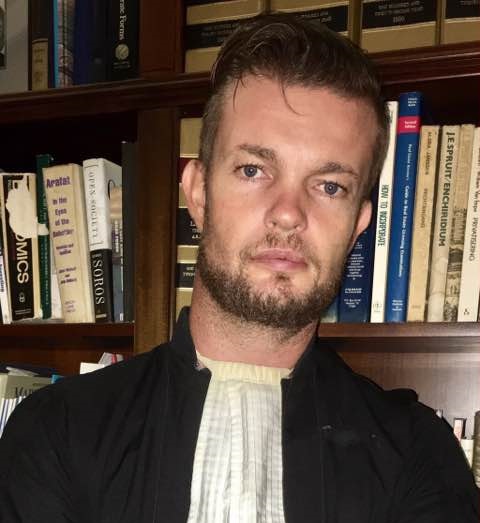Attorney stands up for victims of violent crimes – UPDATED

PHILIPSBURG – The position of victims of violent crimes in St. Maarten is weak compared to that of the criminals who harmed them. Attorney Geert Hatzmann, who has represented many of these victims over the course of his career on the island, intends to do something about it with the establishment of the Foundation of Victims of Violent Crimes.
Hatzmann urges Minister of Justice Anna Richardson in a letter dated December 15 to explain her position on this issue. “Are you okay with it that victims of serious violent crimes are left to their own devices or do you agree with me that this malpractice has to stop immediately and are you going to do something about it today?”
Hatzmann mentions nine examples of violent crimes whereby the court awarded damages to the victims. But because the perpetrators did not have any assets, those claims were never paid out. The first one (that still has to go to court), this week’s robbery in the Van Romondtsteeg whereby the victim was stabbed several times in the eye, inspired Hatzmann’s to address the issue with the minister.
Among the other examples in his letter are the robbery and rape of a 62-year old newspaper saleswoman, the rape and robbery of a 19-year old girl by the same criminal and a 17-year old girl who became the victim of revenge porn.
Hatzmann points out that a perpetrator, once apprehended, is entitled to a court appointed attorney at no charge. “That is good because in a constitutional state every suspect, no matter how horrible the charges against him are, is entitled to legal assistance.”
Unfortunately the position of the victims is far worse. Psychological or psychiatric evaluation of a suspect is free of charge, “but if a woman who saw her daughter being shot to death and who had to duck a bullet wants to visit a psychologist to deal with her trauma has to pay $100 for each session.”
Hatzmann furthermore charges that the Public Prosecutor’s Office is hardly there for the victims. “It routinely sends a note explaining that victims can submit a civil claim during a criminal procedure but it offers no help whatsoever. Victims often do not understand the message and appear in court without documents to support their claim. Then they do not submit a claim or the court declares their claim inadmissible.”
While suspects get an attorney free of charge, victims have to pay for legal assistance. But even if the court awards damages, victims often remain empty-handed because the perpetrator cannot pay, Hatzmann points out.
“Victims can turn to the country for the payment of damages only eight months after a verdict has become irrevocable and only for a maximum of 5,000 guilders.”
The maximum claim victims can submit in a criminal procedure is 50,000 guilders and in civil procedures there is no maximum. “In this context the amount of 5,000 guilders is laughable.”
Hatzmann refers to the report Slachtofferhulp in Sint Maarten (Assistance for Victims in Sint Maarten) published by the Law Enforcement Council in 2012. In that report, the council expresses the urgent need for the establishment of a Bureau Slachtofferhulp (Bureau for the Assistance of Victims) and Claim Fund for Violent Crimes.
“The complete neglect in this respect, results in a situation whereby victims are left completely to their own devices while they do not have any realistic chance to receive an awarded claim for damages. That amounts to an unlawful act by the government,” Hatzmann writes.
The attorney announces in his letter the intention to establish the Foundation of Victims of Violent Crimes. “Through this foundation I will summon you, at the very least the country, to pay all individual claims for damages awarded by the court to the victims.”
In case payment is declined, Hatzmann intends to enforce it in court. The attorney echoes the Law Enforcement Council’s recommendation for the establishment of a Bureau Slachtofferhulp and a Claim Fund for Victims of Violent Crimes.
“Unfortunately,” Hatzmann notes in the final paragraph of his letter, “I have never caught you or any of your predecessors on an opinion or a vision related to this matter. I am really very curious about your reaction.”
UPDATE per Friday, December 18, 2020:
 On Friday, Hatzmann had a constructive meeting with Justice Minister Anna Richardson.
On Friday, Hatzmann had a constructive meeting with Justice Minister Anna Richardson.
“She told me that the establishment of a Stichting Slachtofferhulp (Victim Support Services) is a top priority for her and that this will be completed by the beginning of 2021,” Hatzmann said.
However, the minister let the attorney know that due to St. Maarten’s precarious financial situation there is currently no possibility for the establishment of a claim fund for victims of violent crimes (Schadefonds Geweldsmisdrijven). For the time being victims will have to make do with a maximum compensation of 5,000 guilders.
“The minister also said that in other countries within the Kingdom the state does not compensate damages in full to victims. According to her the Dutch Schadefonds is a private foundation,” Hatzmann said.
However, the website of this fund states the following: “The Schadefonds is an independent administrative body and it has been established in 1976. It falls under the responsibility of the Minister of Justice and Security. She finances the fund and we are accountable to the minister.”
“I stick to my opinion that the Ministry of Justice is responsible for this and that it has to allocate money for it, though it would obviously help if private citizens also contribute financially,” Hatzmann said.
Minister Richardson has asked for the attorney’s cooperation with the establishment of the foundation she has in mind and to provide advice and input.
“I have reacted positively to this request,” Hatzmann said. “What the cooperation will look like still has to be determined. I want to appeal to victims and family of victims of violent crimes who need legal assistance to contact me. I will always be prepared to talk with them and to see what I can do for them.”


























